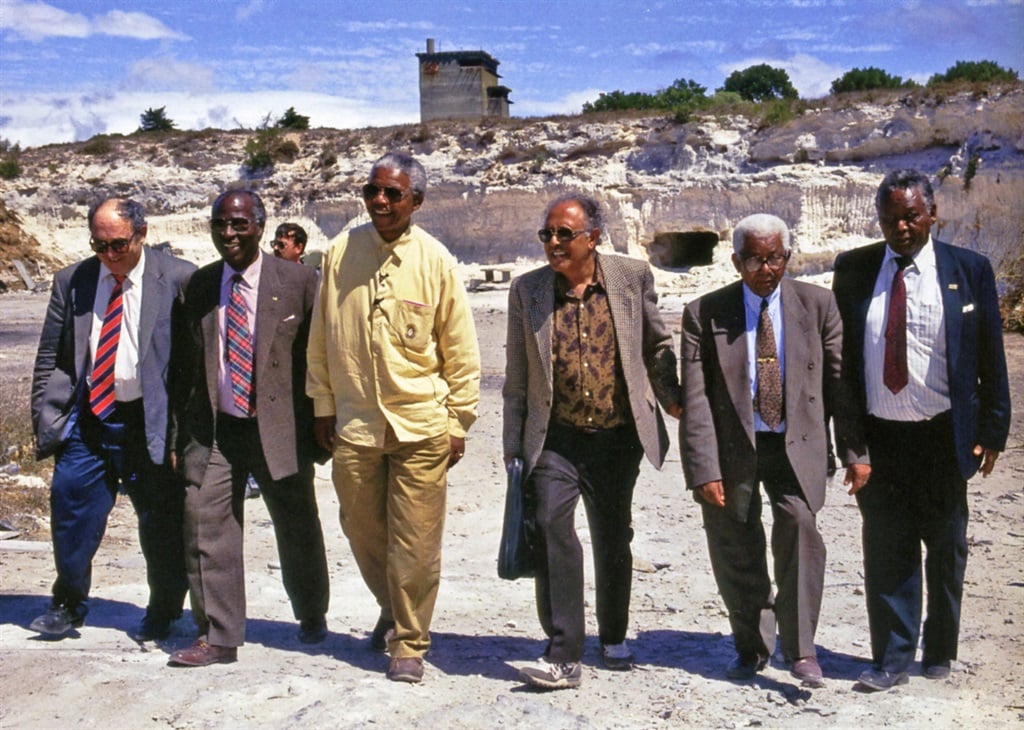- Nelson Mandela and seven others were sentenced to life imprisonment 56 years ago today.
- Mandela would go on to spend 27 years in prison before he was released.
- This is what happened at the Rivonia Trial, and the sentence they received.
Fifty-six years ago, Judge Quartus de Wet, sentenced Nelson Mandela and seven others to life imprisonment in what became known as the Rivonia trial.
Mandela, Ahmed Kathrada, Walter Sisulu, Elias Motsoaledi, Andrew Mlangeni, Govan Mbeki, Raymond Mhlaba and Denis Goldberg were convicted of sabotage the previous day, on 11 June 1964.
In what was later remarked as a ruling that saved Mandela’s life, De Wet said the only leniency he could grant Mandela and his seven co-accused was to sentence them to life imprisonment instead of the death penalty.
The group were arrested in 1963 on the Liliesleaf Farm, Rivonia, where they were discussing operation Mayibuye, a part of the ANC’s armed struggle against apartheid.
De Wet would pass away before Mandela was released from prison in 1990 – 27 years later, but Mandela would go on to have lunch with the state prosecutor in his case, Percy Yutar, as an act of reconciliation after his release.
Here is what happened in the Rivonia trial, and what the sentence was:
When and where were Nelson Mandela and his co-accused arrested?
Apartheid police arrested Lionel Bernstein, Arthur Goldreich, Bob Hepple, Moosa Moolla, Abdulhay Jassat, Harold Wolpe, Goldberg, Kathrada, Mbeki, Mhlaba, Mlangeni, Motsoaledi, and Sisulu at the Liliesleaf Farm, Rivonia, on 11 July 1963.
The group, members of the ANC’s military wing uMkhonto we Sizwe (MK), were holding a meeting around operation Mayibuye, an elaborate plan to destabilise the apartheid government through an armed struggle.
Along with their arrest, documents and plans of the military operation were confiscated by police.
Mandela was already in police custody at the time, after he was arrested in Howick, KwaZulu-Natal, in August 1962.
What happened during the trial?
Before the trial started, and the apartheid government made use of the 90-days without trial detention rule, Goldreich and Wolpe managed to escape from prison by bribing a prison guard, and the state soon withdrew charges from Hepple who fled the country shortly after his release.
The 10 remaining accused were represented by Joel Joffe, Bram Fischer , Vernon Berrangé, Arthur Chaskalson and George Bizos.
At the beginning of the defence’s proceedings, in what become known as one of the key moments in South Africa’s democracy, Mandela decided to make a statement from the dock instead of testifying.
In a moving three hour speech, he explained and defended the ANC’s key political positions, and did not deny his involvement in planning sabotage to fight the apartheid regime.
He ended his speech by saying: “It is an ideal for which I hope to live for and to see realised. But, my Lord, if it needs be, it is an ideal for which I am prepared to die.”
What was the ruling?
Judge De Wet found eight of the accused guilty of sabotage a day before sentencing took place on 12 June 1964.
In a one-page sentencing statement, De Wet said: “The function of this Court, as is the function of a Court in any country, is to enforce law and order, and to enforce the laws of the State within which it functions.”



Pictured 11 February 1994, Nelson Mandela and six of this fellow prisoners return to the lime quarry where they worked. From left: Dennis Goldberg, Andrew Mlangeni, Nelson Mandela, Ahmed Kathrada and Walter Sisulu, all fellow defendants at the Treason Trial. On the far right is Wilson Mkwayi, who was arrested after the Rivonia Trial and tried and convicted separately on similar charges.
He said during the course of the trial the accused and their defence tried to argue that their actions were entirely motivated to improve the situation of South Africa’s “non-European population”.
However, De Wet said he was not convinced that their motives are as self-sacrificing as they wanted the court to believe.
“People who organise a revolution usually plan to take over the government, and personal ambition cannot be excluded as a motive,” De Wet said.
He said the crimes which Mandela and his co-accused have been convicted of is “the crime of conspiracy, is in essence one of high treason”.
However, after he gave the matter “serious consideration”, he decided not to impose the “supreme penalty” of the death penalty which would have been the “proper penalty for the crime”, and instead sentenced them to life imprisonment.
“But consistent with my duty, that is the only leniency which I can show,” De Wet said.

